Nestled in the heart of London’s Mayfair district, Wheatsheaf Group Limited has quietly emerged as a pivotal force in agricultural water innovation. With a laser focus on technologies that bridge the gap between sustainable agriculture and water management, this investment firm has built a portfolio that reads like a who’s who of water tech breakthroughs. From nutrient recovery systems that transform wastewater into valuable fertilizers to cutting-edge water treatment solutions that are revolutionizing farm operations, Wheatsheaf’s strategic investments are crafting a new narrative in the water-food nexus. As water entrepreneurs and impact investors seek opportunities in this rapidly evolving space, understanding Wheatsheaf’s investment philosophy and portfolio approach has never been more crucial.
Wheatsheaf Group Limited is part of my Ultimate Water Investor Database, check it out!
Investor Name: Wheatsheaf Group Limited
Investor Type: PE
Latest Fund Size: $ Million
Dry Powder Available: Yes
Typical Ticket Size: <$250k
Investment Themes: Nutrient Recovery, Proprietary Water Treatment Technologies, Regenerative Agriculture/Water Stewardship
Investment History: $5333333.33 spent over 2 deals
Often Invests Along: VantagePoint Capital Partners
Already Invested In: Ostara Nutrient Recovery Technologies Inc., Ostara Nutrient Recovery Technologies Inc. (o)
Leads or Follows: Lead
Board Seat Appetite: High
Key People: Fiona Jane Emmett, Anthony William Searson James, Lisa Sorrell, Francis Scott, William Kendall
The Investment Philosophy: Where Water Meets Agriculture
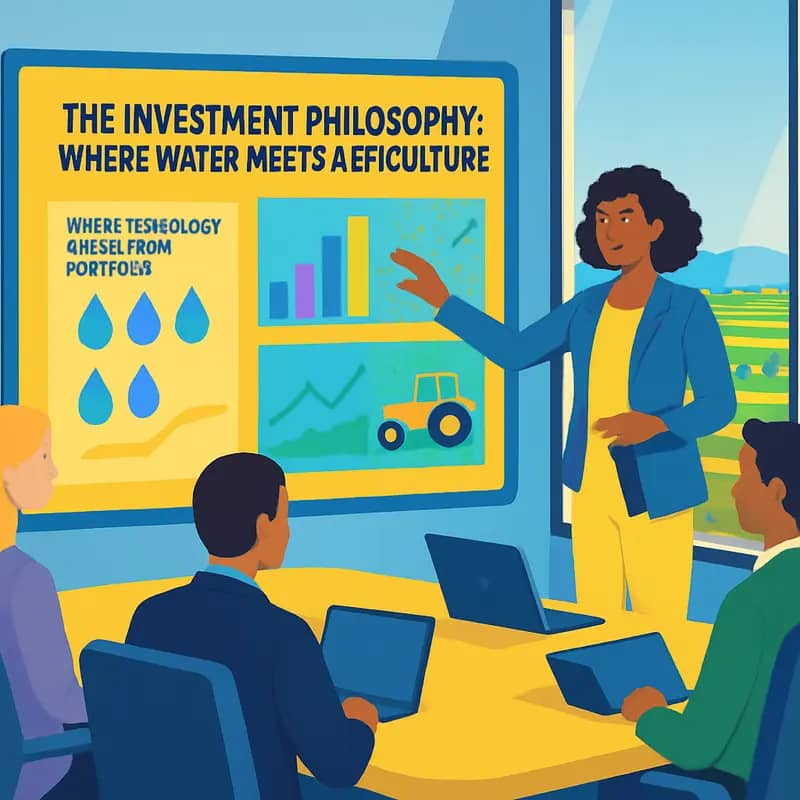
At the intersection of agriculture and water technology lies Wheatsheaf Group’s distinctive investment approach. The firm has strategically positioned itself to address one of humanity’s most pressing challenges: sustainable water management in food production. This philosophy stems from a deep understanding that agricultural innovation must prioritize water efficiency to meet growing global food demands.
Wheatsheaf’s investment strategy centers on late-stage growth companies, typically deploying capital in the £10-50 million range. This focus allows them to support businesses that have already validated their technologies and business models but need additional capital and expertise to scale. The approach minimizes early-stage risks while maximizing the potential for meaningful impact in water conservation and agricultural productivity.
What sets Wheatsheaf apart is their commitment to long-term value creation rather than quick exits. They recognize that transforming agricultural water management requires patient capital and sustained support. This mindset enables portfolio companies to develop and implement solutions that address complex challenges like precision irrigation, water recycling, and drought resilience.
The firm’s investment thesis aligns with what many industry experts have identified as a critical gap in agricultural technology funding. As explored in ‘How to Take Mid-Market Green Tech Companies to the Next Level‘, scaling proven technologies requires more than just capital – it demands strategic guidance and access to market networks, both of which Wheatsheaf provides.
Their portfolio reflects a holistic understanding of agricultural water challenges. Rather than pursuing isolated technological solutions, they invest in complementary technologies that work together to create more resilient and sustainable farming systems. This includes innovations in soil moisture monitoring, water treatment and reuse, and smart irrigation systems.
Wheatsheaf’s approach also emphasizes the importance of commercial viability. They seek technologies that not only conserve water but also deliver clear economic benefits to farmers and agricultural businesses. This dual focus on environmental and financial sustainability ensures that solutions gain widespread adoption and create lasting impact.
By maintaining a specialized focus on the agriculture-water nexus, Wheatsheaf has developed deep sector expertise that informs their investment decisions and adds value to portfolio companies. This expertise extends beyond pure technology assessment to include regulatory understanding, market dynamics, and implementation challenges specific to agricultural water management.
Portfolio Deep Dive: Nurturing Water Innovation
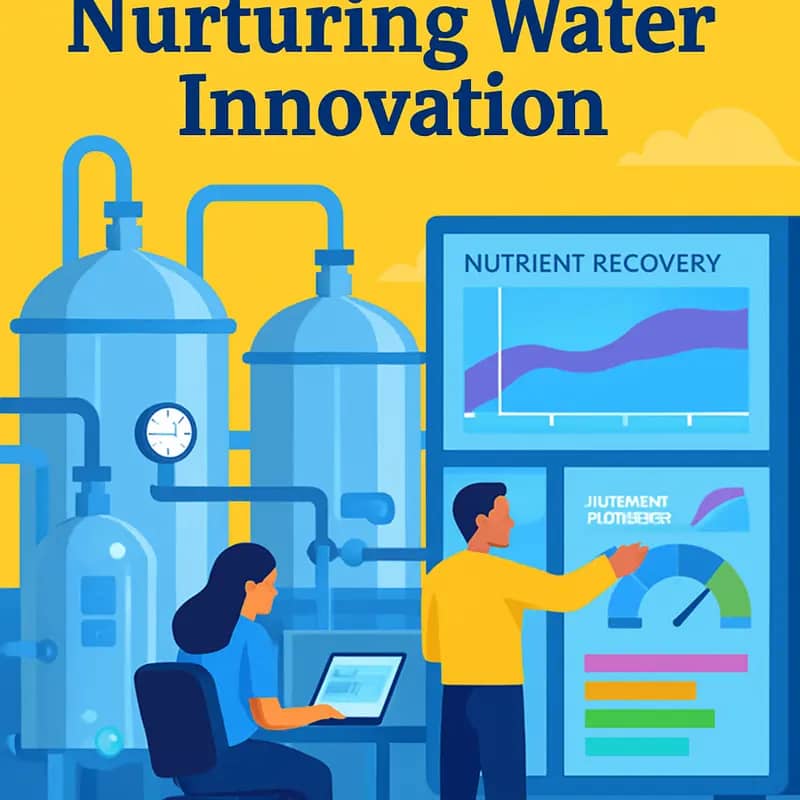
Wheatsheaf Group’s water technology portfolio represents a strategic focus on solutions that address critical challenges in agricultural water management. Their investment in Ostara Nutrient Recovery Technologies exemplifies this approach, targeting the intersection of resource recovery and sustainable water treatment.
Ostara’s nutrient recovery system transforms wastewater streams from agricultural and municipal sources into high-value fertilizer products while simultaneously improving water quality. This dual-benefit approach aligns perfectly with Wheatsheaf’s mandate to generate both environmental and financial returns. The technology recovers phosphorus and nitrogen from waste streams, reducing harmful nutrient loads in waterways while creating premium fertilizer products that support sustainable agriculture.
Beyond Ostara, Wheatsheaf has developed a comprehensive portfolio of water treatment solutions that address various agricultural challenges. Their investments typically focus on proven technologies ready for commercial scale-up, with investment sizes ranging from £10-50 million. This strategy allows them to accelerate the adoption of innovative water management solutions while managing investment risk.
Wheatsheaf’s portfolio companies benefit from significant operational support beyond mere financial investment. Their hands-on approach includes providing technical expertise, market access strategies, and commercial partnerships that help portfolio companies achieve rapid growth. This support has proven particularly valuable in helping water technology companies navigate the complex regulatory landscape and establish credibility with conservative agricultural customers.
The group’s investment thesis centers on technologies that demonstrate clear potential for global scalability. They actively seek solutions that can be deployed across multiple agricultural sectors and geographies, maximizing both impact and returns. This approach has led to investments in water monitoring systems, precision irrigation technologies, and water treatment solutions that can be applied across diverse agricultural operations.
Their portfolio companies typically share common characteristics: proven technology readiness, clear market validation, and strong intellectual property protection. This focus on mature technologies helps minimize technical risk while maximizing the potential for rapid market adoption. The group’s investment strategy also emphasizes solutions that can demonstrate measurable environmental benefits alongside commercial success, creating a powerful combination of impact and returns.
Leadership Style: Active Engagement in Water Tech

Wheatsheaf Group’s leadership approach in water technology investments reflects a deeply hands-on philosophy that goes far beyond traditional capital deployment. The firm’s active engagement strategy manifests through strategic board positions, technical expertise sharing, and collaborative development of portfolio companies’ growth trajectories.
At the core of Wheatsheaf’s engagement model lies a sophisticated board participation framework. Rather than taking passive board seats, the firm’s representatives actively shape strategic decisions while respecting management autonomy. This balanced approach allows portfolio companies to benefit from Wheatsheaf’s extensive water sector expertise while maintaining their innovative spirit and operational independence.
The firm’s technical engagement stands out through its dedicated team of water technology specialists who work alongside portfolio companies’ R&D departments. These specialists help validate technical assumptions, accelerate product development cycles, and identify potential synergies across the portfolio. This technical oversight has proven particularly valuable in helping companies navigate complex regulatory environments and achieve necessary certifications.
Wheatsheaf’s commercial acceleration support represents another critical dimension of their active investment approach. The firm leverages its extensive network within the agricultural and water sectors to facilitate strategic partnerships, pilot projects, and commercial contracts. This commercial support often proves decisive in helping portfolio companies bridge the challenging gap between innovative technology and market adoption.
What truly distinguishes Wheatsheaf’s engagement model is its focus on fostering collaboration across portfolio companies. The firm regularly organizes knowledge-sharing sessions and technical workshops, creating a collaborative ecosystem where solutions can be cross-pollinated and enhanced. This approach has led to several successful joint development projects between portfolio companies, maximizing the value of Wheatsheaf’s investments.
The firm’s commitment to sustainable water management extends to its role in shaping industry standards and practices. Through active participation in water technology forums and policy discussions, Wheatsheaf helps create favorable conditions for innovative water solutions while ensuring their portfolio companies remain at the forefront of industry developments.
This comprehensive engagement strategy aligns with broader industry trends toward impact investing in water technology, where investors increasingly recognize that financial returns and environmental impact can be mutually reinforcing objectives. Wheatsheaf’s approach demonstrates that active investor engagement can accelerate both technological advancement and commercial success in the water sector.
Future Horizons: Scaling Water Solutions
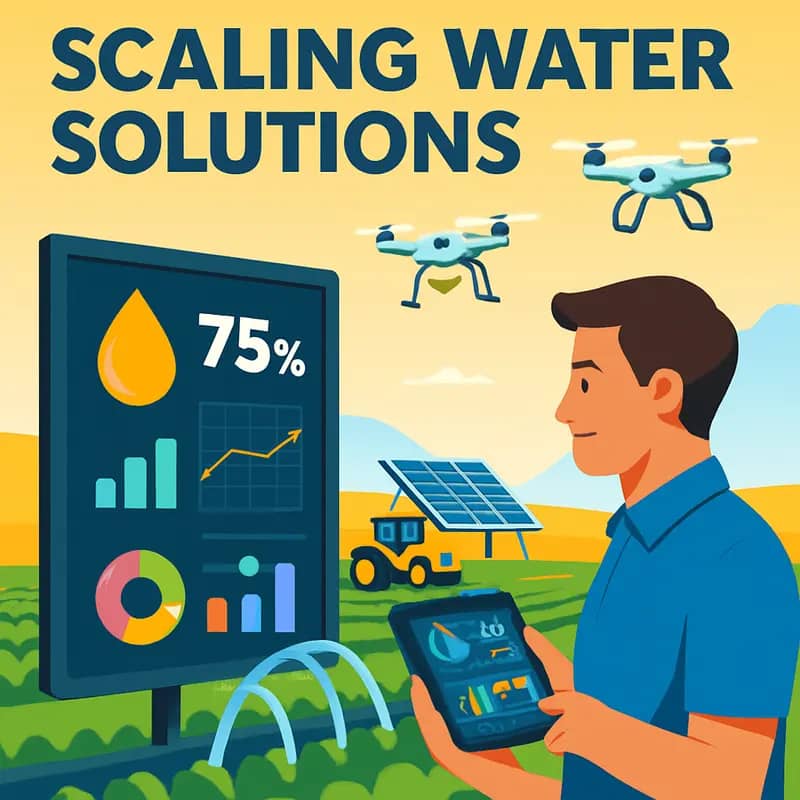
Wheatsheaf Group’s vision for agricultural water management is rooted in a scalable, technology-driven approach that addresses global water scarcity while delivering commercial returns. By strategically deploying capital across their portfolio companies, they’re building an interconnected ecosystem of solutions that can be rapidly scaled across different agricultural contexts and geographies.
Their scaling strategy revolves around three core pillars: technology validation, market adaptation, and strategic partnerships. Rather than pursuing a one-size-fits-all approach, Wheatsheaf works closely with portfolio companies to validate technologies in specific regional contexts before expanding to new markets. This methodical expansion ensures solutions are both technically sound and commercially viable in each new environment.
Crucial to their scaling approach is a deep understanding of water risk assessment and business opportunities. The group prioritizes technologies that can demonstrate clear economic benefits alongside environmental impact, making adoption more attractive for agricultural enterprises of all sizes. Their follow-on investment strategy is similarly pragmatic, focusing on companies that show both strong market traction and the potential for exponential growth.
Wheatsheaf’s approach to geographical expansion is particularly noteworthy. They’ve developed a hub-and-spoke model where successful implementations in one region serve as proof points for expansion into adjacent markets. This approach allows portfolio companies to build credibility and operational expertise while managing growth-related risks. The group actively supports cross-border expansion through their global network of agricultural partners and industry contacts.
Looking ahead, Wheatsheaf is positioning itself to capitalize on the increasing convergence of agricultural technology and water management. They’re particularly focused on solutions that leverage data analytics and automation to optimize water usage across farming operations. This includes investments in precision irrigation technologies, smart monitoring systems, and water recycling solutions that can be integrated into existing agricultural infrastructure.
Their follow-on investment strategy emphasizes supporting portfolio companies through multiple growth phases. Rather than seeking quick exits, Wheatsheaf takes a long-term view, providing not just capital but also operational expertise and market access. This patient capital approach allows portfolio companies to develop robust solutions that can withstand market fluctuations and scaling challenges.
The group is also exploring innovative financing models to accelerate adoption of water-efficient technologies in emerging markets. By partnering with development finance institutions and impact investors, they’re creating blended finance solutions that can help overcome the initial cost barriers often associated with advanced water management systems.
Investment Philosophy: Where Water Meets Wisdom

At the heart of Wheatsheaf Group’s transformative approach to agricultural water management lies a sophisticated investment philosophy that masterfully balances financial returns with environmental impact. The group’s methodology centers on identifying technologies that address critical water challenges while demonstrating clear pathways to scalability and commercial success.
Wheatsheaf employs a three-tiered evaluation framework when assessing potential water technology investments. First, they examine the core innovation’s potential to drive meaningful water conservation or quality improvements at scale. Solutions must demonstrate at least a 25% improvement over existing technologies in either water efficiency or treatment effectiveness. Second, they evaluate the commercial viability through extensive market analysis and pilot testing with agricultural partners. Finally, they assess the broader environmental impact potential, particularly focusing on energy efficiency and carbon footprint.
What sets Wheatsheaf’s investment approach apart is their patient capital model. Unlike traditional venture capital firms that typically seek exits within 5-7 years, Wheatsheaf maintains a longer-term horizon of 8-12 years for water technology investments. This extended timeline acknowledges the unique challenges of scaling water solutions in the agricultural sector, where adoption cycles are often slower due to seasonal testing requirements and regulatory considerations.
Risk assessment takes on multiple dimensions in Wheatsheaf’s framework. Beyond standard technical and market risks, they place particular emphasis on regulatory risk analysis, given the heavily regulated nature of agricultural water use. Their due diligence process includes detailed assessments of water rights implications, environmental permits, and potential policy changes that could impact technology adoption.
The group has developed an innovative impact measurement system that quantifies both direct water savings and indirect environmental benefits. This data-driven approach helps unlock business opportunities while mitigating water risks, enabling Wheatsheaf to demonstrate concrete environmental returns alongside financial performance.
Notably, Wheatsheaf actively seeks technologies that create positive feedback loops between economic and environmental outcomes. For instance, they prioritize solutions that reduce agricultural water consumption while simultaneously improving crop yields or soil health. This dual-benefit approach helps accelerate adoption by providing clear economic incentives for farmers while delivering on environmental objectives.
Their portfolio construction strategy reflects a deliberate balance between early-stage innovations and proven technologies ready for scale-up. This diversification helps manage risk while maintaining exposure to potentially breakthrough solutions. Typically, they allocate 30% of investments to early-stage companies, 50% to growth-stage opportunities, and 20% to mature technologies seeking geographical expansion.
Portfolio Deep Dive: Innovation in Action
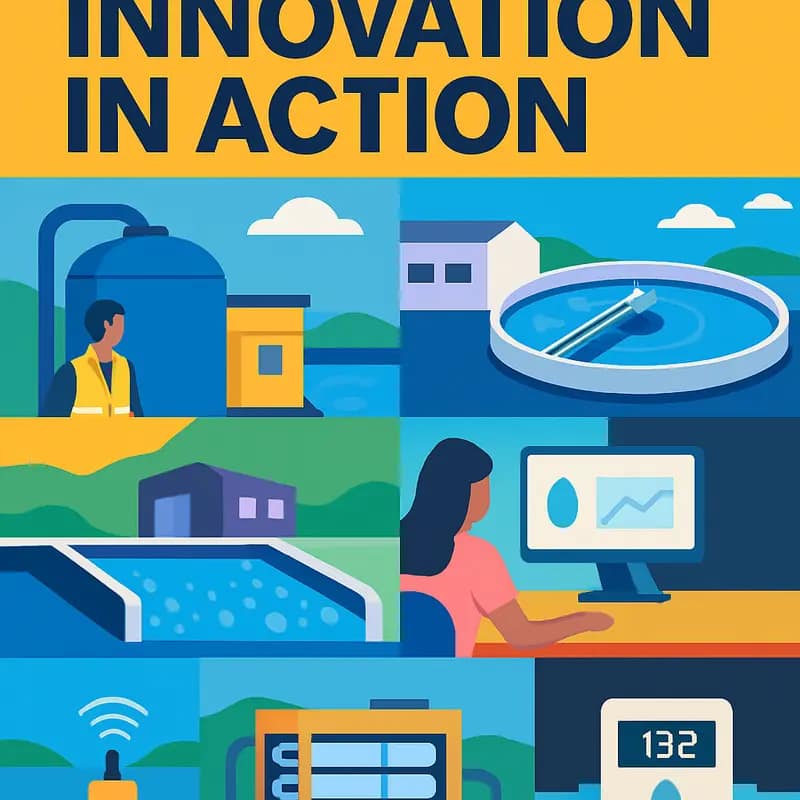
Wheatsheaf Group’s water technology portfolio showcases groundbreaking solutions that are reshaping agricultural water management. Their strategic investments target companies developing transformative technologies across irrigation efficiency, water quality monitoring, and resource recovery.
A standout innovation in their portfolio focuses on precision irrigation systems that utilize advanced soil moisture sensing and weather data analytics. This technology has demonstrated water savings of up to 40% while maintaining or improving crop yields across diverse agricultural settings. The system’s AI-powered algorithms optimize irrigation schedules and water delivery, preventing both over- and under-watering.
In the critical area of water quality monitoring, Wheatsheaf has backed the development of real-time sensing platforms that provide continuous data on key parameters like nutrient levels, salinity, and contaminants. These systems enable farmers to make data-driven decisions about water management and detect potential issues before they impact crop health. Field trials have shown this proactive approach reduces fertilizer usage by 25% while improving water use efficiency.
Wheatsheaf’s commitment to circular water solutions is evident in their investment in water recovery and reuse technologies. One portfolio company has pioneered a membrane-based system that treats and recycles agricultural runoff, capturing valuable nutrients while producing water suitable for irrigation. This closed-loop approach has been implemented at several large-scale operations, reducing freshwater withdrawal by up to 60% and cutting operational costs.
The group’s investment in decentralized treatment solutions is particularly noteworthy. These systems, designed specifically for agricultural applications, combine physical and biological treatment processes to handle varying water quality challenges. The modular nature of these solutions allows for scalable implementation across different farm sizes and types.
Beyond individual technologies, Wheatsheaf’s portfolio companies demonstrate remarkable synergies. Their integrated approach allows farmers to combine multiple solutions, creating comprehensive water management systems that address the full spectrum of agricultural water challenges. This systems-thinking approach has proven crucial for achieving meaningful sustainability improvements at scale.
As explored in How to Mitigate 4 Shades of Water Risk Through Impact Investing, these innovations are not just technological achievements but represent strategic approaches to managing water-related risks in agriculture. The portfolio’s success validates Wheatsheaf’s thesis that sustainable water management can drive both environmental and financial returns.
Impact Metrics: Measuring Water’s True Value
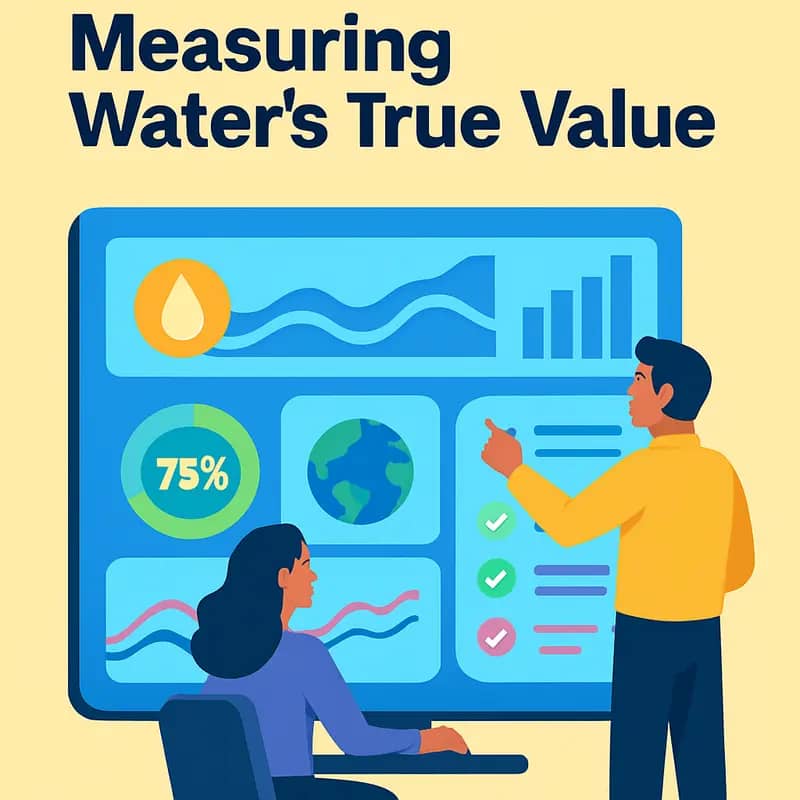
Wheatsheaf Group has pioneered a sophisticated framework for quantifying the impact of their water technology investments, moving beyond traditional financial metrics to capture true environmental and social value. Their approach integrates multiple layers of measurement, creating a comprehensive picture of water conservation achievements and broader societal benefits.
At the core of their impact assessment lies a water-specific ESG methodology that tracks both immediate and long-term effects. The framework evaluates water savings through direct measurement of reduced consumption, improved efficiency in agricultural irrigation, and decreased water losses in distribution networks. These metrics are standardized across their portfolio, enabling meaningful comparisons and aggregate impact reporting.
The group’s measurement protocols extend beyond simple volumetric calculations. They factor in the quality improvements in treated water, considering parameters like biological oxygen demand reduction, nutrient removal efficiency, and contaminant elimination rates. This holistic approach helps quantify the true environmental impact of their water treatment technologies.
Social impact indicators form another crucial component of their measurement system. These metrics capture improvements in water access for underserved communities, job creation in the water sector, and enhanced agricultural productivity through better water management. The framework aligns closely with established sustainability goals while incorporating innovative metrics that reflect the unique challenges of water technology investments.
Wheatsheaf’s measurement approach also emphasizes the economic dimension of water conservation. Their metrics track cost savings for utilities and agricultural operations, reduced energy consumption in water treatment processes, and the financial benefits of improved water quality for industrial users. This economic lens helps demonstrate the business case for sustainable water management while highlighting the broader societal returns on investment.
The group maintains stringent verification protocols for their impact metrics. Independent auditors regularly review their measurement methodologies and data collection processes. This commitment to transparency and accuracy has established Wheatsheaf as a trusted leader in impact measurement within the water technology sector.
Their framework continues to evolve, incorporating new metrics as water challenges and technologies advance. Recent additions include measurements of carbon footprint reduction through water conservation and metrics tracking the resilience of water systems to climate change impacts. These forward-looking indicators ensure their impact measurement remains relevant and comprehensive.
Wheatsheaf’s robust approach to impact measurement has become a model for other investors in the water sector, demonstrating how rigorous quantification of environmental and social benefits can drive better investment decisions and accelerate the adoption of sustainable water technologies.
Future Flow: Strategic Vision and Opportunities
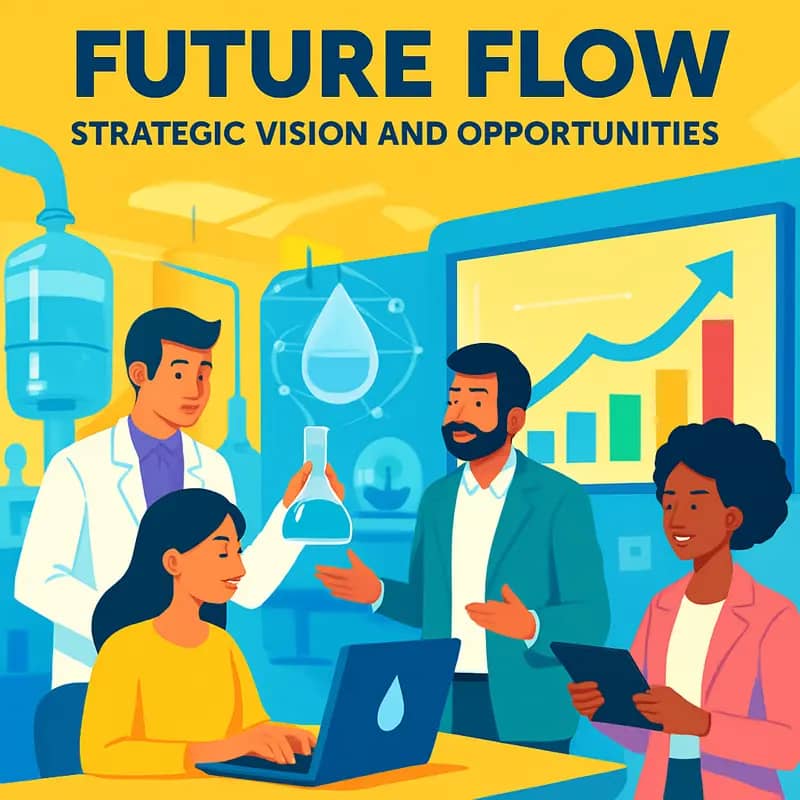
Wheatsheaf’s strategic vision for water technology investments is crystallizing around three key imperatives: resource efficiency, climate resilience, and technological convergence. Building on their established impact metrics and ESG framework, the group is positioning itself to capitalize on emerging opportunities while addressing critical water challenges.
A central focus remains on technologies that dramatically improve water use efficiency in agriculture. Rather than pursuing incremental gains, Wheatsheaf targets step-change innovations that can reduce agricultural water consumption by 30% or more. This includes advanced precision irrigation systems, drought-resistant crop development, and water recycling solutions tailored for farming operations.
The group has identified climate resilience as a major investment theme for the coming decade. As extreme weather events become more frequent, Wheatsheaf is actively seeking technologies that help agricultural systems adapt and thrive. This encompasses innovations in weather prediction, smart water storage, and systems that can rapidly adjust to changing conditions.
Technological convergence represents perhaps the most exciting frontier in Wheatsheaf’s strategy. The group is particularly interested in solutions that combine artificial intelligence, IoT sensors, and advanced materials science to create integrated water management systems. This convergence enables previously impossible levels of optimization and resource efficiency.
For entrepreneurs and co-investors, Wheatsheaf’s approach opens several compelling pathways. The group maintains a flexible investment model that can accommodate various stages of technology development, from early-stage ventures to growth capital for proven solutions. What’s consistent is their focus on scalable technologies that can demonstrate measurable impact in water conservation or efficiency.
Significantly, Wheatsheaf is actively cultivating strategic partnerships that can accelerate technology adoption. Their deep connections in the agricultural sector provide portfolio companies with valuable testbeds and potential customers. This commercial validation is crucial for water technology startups looking to establish market credibility.
The investment landscape for water technology is evolving rapidly, with increasing attention from mainstream investors. However, Wheatsheaf’s established expertise and sector-specific approach position them uniquely to identify and nurture breakthrough solutions. Their focus on technologies that can deliver both environmental and commercial returns aligns with broader trends in sustainable investing.
Looking ahead, Wheatsheaf’s pipeline includes opportunities in alternative water sources, advanced treatment technologies, and intelligent distribution systems. The group is particularly interested in solutions that can be deployed across multiple geographies and agricultural contexts, maximizing potential impact.
Final words
Wheatsheaf Group Limited stands as a testament to the power of strategic investment in water technology, particularly within the agricultural sector. Their approach – combining substantial capital deployment with active management and board participation – has proven instrumental in scaling solutions that address critical challenges in water management and sustainable agriculture. Through their focus on nutrient recovery, water treatment innovations, and regenerative agricultural practices, they’ve demonstrated how patient capital, coupled with technical expertise, can drive meaningful change in the water-food nexus. For water entrepreneurs and impact investors, Wheatsheaf’s model offers valuable lessons in building and scaling water technology companies. Their emphasis on later-stage investments, coupled with a clear focus on technologies that deliver both environmental and commercial benefits, provides a blueprint for successful investment in the water sector. As we look toward a future where water scarcity and agricultural sustainability become increasingly critical, Wheatsheaf’s investment philosophy and portfolio approach offer inspiring examples of how strategic capital can drive innovation and create lasting impact in the water technology landscape.
Wanna explore the Full List of Water Investors that cut at least two checks over the past decade? Check it out and bookmark it, I update it regularly!
Learn more: https://dww.show/the-ultimate-water-investor-database/
About us
Through my “(don’t) Waste Water” platform, I offer unique and insightful coverage of the water industry that combines technical expertise with engaging storytelling. If you haven’t yet, it might be time for you to subscribe to the podcast, the youtube channel and/or the newsletter!
